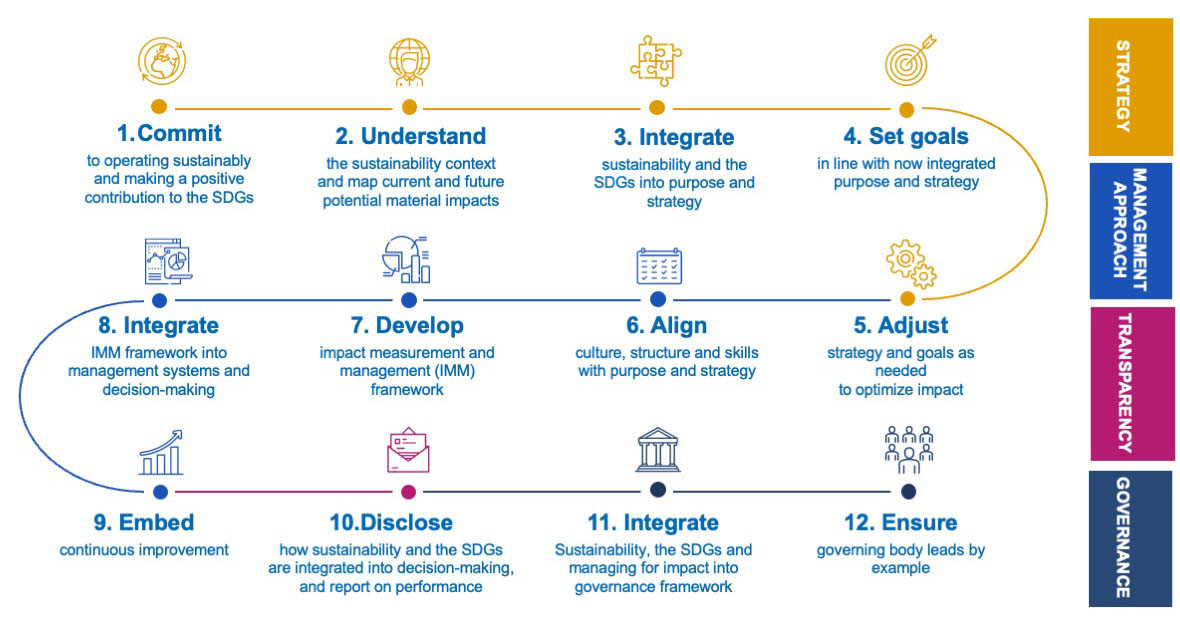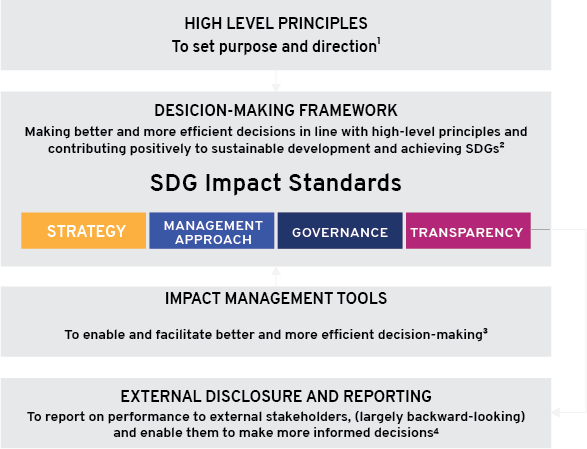The Standards are for Enterprises committed to contributing positively to sustainable development and towards achieving the SDGs. All Enterprises – irrespective of size, geography, or sector – can use the Standards. This includes publicly listed enterprises, public-interest, and private entities (both for-profit or not-for-profit), non-governmental organizations (NGOs), small and medium enterprises (SMEs), and state-owned or other public-sector entities.
The Standards set out a decision-making framework to help Enterprises integrate impact management into their strategy, management approach, disclosure, governance and decision-making practices. They help Enterprises link their approach to creating long-term, sustainable value for the Enterprise with contributing positively to sustainable development in line with the SDGs. They do this by directing attention and resources to where Enterprises can optimize their contribution by focusing on material positive and negative impacts. Embedding the Standards into management decision-making will strengthen impact performance and facilitate higher quality and more consistent disclosures.
The Standards are provided to organizations as a ‘best practice’ guide to help them operate more sustainably and optimize their contribution to sustainable development and the SDGs by integrating responsible business and impact management practices into their organizational systems and internal decision-making.
Enterprises can follow the following actions to properly integrate operating sustainably and contributing positively to sustainable development and the SDGs into their organizational systems and decision-making.

Download About the SDG Impact Standards
Download the FAQs
Download the Glossary
Download the SDG Impact Standards for Enterprises version 1.0
Download Guidance for the SDG Impact Standards for Enterprises
Download the SDG Impact Self-Assessment Tool for Enterprises
Download the response to the most recent consultation input
Download the mapping to the SDGD Recommendations
Download the mapping to the UNGC CFO Principles
Download a case study on the use of the standards by a German enterprise
Download the SDG Impact Standards for Enterprises version 1.0 French
Download the SDG Impact Self-Assessment Tool for Enterprises
Download the SDG Impact Standards for Enterprises version 1.0 in Japanese
Download the Enterprise Actions in Japanese
Download the SDG Impact Self-Assessment Tool for Enterprises in Japanese
Download the SDG Impact Standards for Enterprises version 1.0 Korean
Download the SDG Impact Standards for Enterprises version 1.0 in Mandarin Chinese
Download the SDG Impact Standards for Enterprises version 1.0 in Spanish
The SDG Impact Standards are grounded in high level principles and provide context for integrating other tools and frameworks into decision-making. Read the SDG Impact Standards Mapping Document to see how the UNDP’s SDG Impact Standards for Private Equity Funds have been developed to support the application of the Operating Principles for Impact Management.

A mapping document illustrating how Operating Principles for Impact Management map to the SDG Impact Standards for Private Equity Funds can be found here.
Footnotes:
1- Operating Principles for Impact Management, UNEP FI's Principles for Positive Impact Finance and Responsible Banking Principles, Principles for Responsible Investment, Social Value International's Social Value Principles, and GIIN Core Characteristics of Impact Investors.
2- Integrating UN Guiding Principles for Business and Human Rights, Ten Principles of UN Global Compact and Impact Management Project shared norms, and contributing positively to sustainable development and achieving the SDGs.
3- For instance, metrics, taxonomies, valuation models, benchmarking tools e.q. IRIS+, GRI, UNCTAD metrics, Voluntary National Reviews (VNRs) on the implementation of the SDGs, SDG Impact Market Intelligence Investor Maps, Nationally Determined Contributions (NDCs) to the Paris Accord, OECD Guidelines for Multinational Enterprises, Capitals Coalition Natural and Social and Human Capitals Protocols, SVI Standards, Blab SDG Action Manager and UNEP FI Impact Analysis Tools.
4- For instance, Integrated
Voluntary independent use
These Standards are provided to Enterprises as a best practice guide and self-assessment tool. Enterprises can use them to align their internal processes, practices and decision making.
Enterprises are encouraged to use the Standards in their entirety as a gap analysis and self-assessment tool, and to fill gaps and improve practice over time.
Voluntary Assurance Framework and SDG Impact Seal
An external assurance framework and SDG Impact Seal are being developed in tandem with making the Standards available as a voluntary, self-assessment guide.
Complementary resources
UNDP is supporting these SDG Impact Standards with:
Sustainable Development Goals © 2022 SDG Impact Terms and Conditions